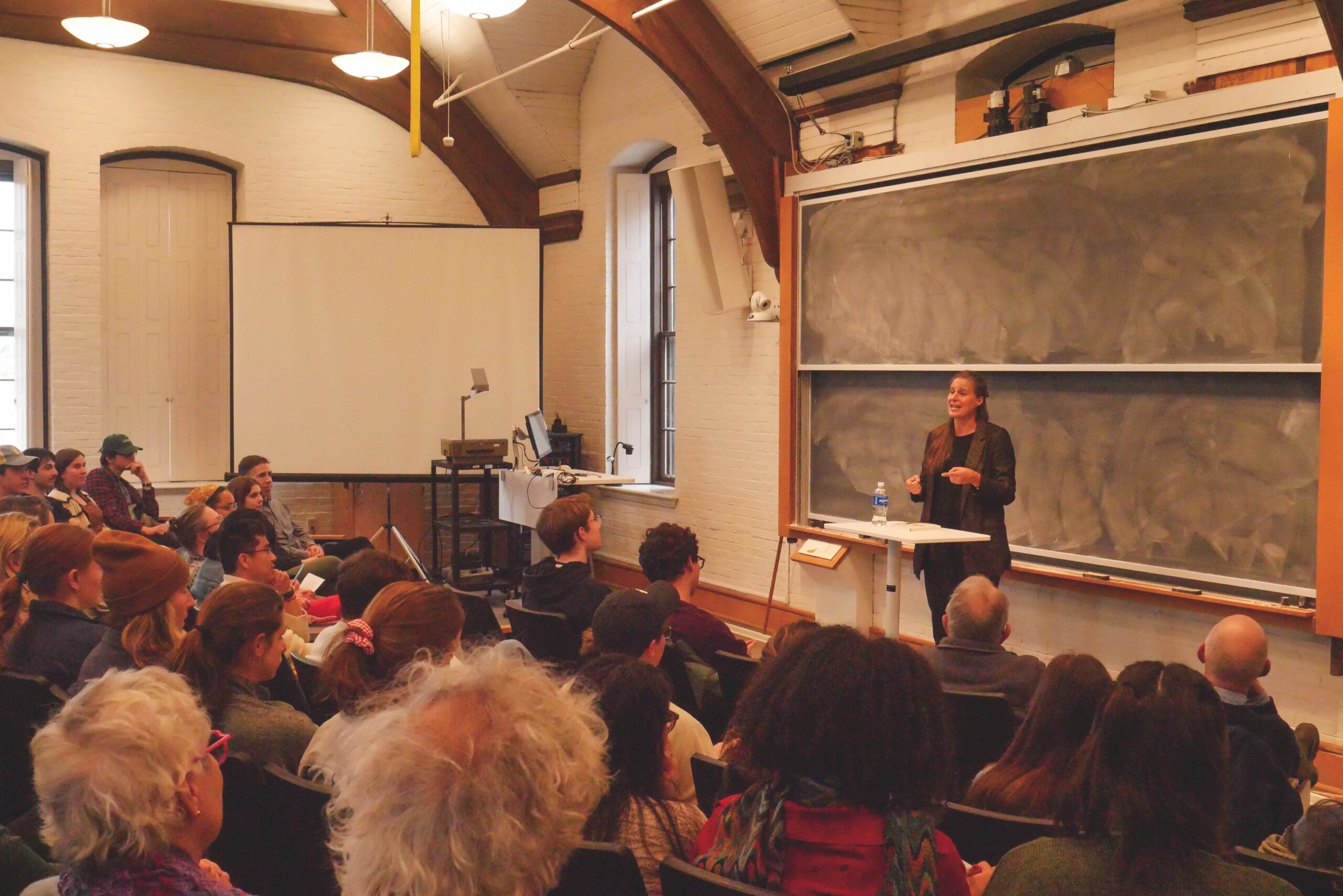Author Lauren Groff talks process and politics in Franklin Burroughs Visiting Environmental Writer reading
April 4, 2025
 Isa Cruz
Isa CruzThe last time Lauren Groff was on Bowdoin’s campus was in the 1990s, playing soccer as an undergraduate for Amherst College. Now, five novels, two short story collections and three times as a National Book Critics Circle Award finalist later, Groff returned to campus on Wednesday evening as this year’s Franklin Burroughs Visiting Environmental Writer.
“‘Environmental’ is an interesting adjective to describe what kind of writer Lauren Groff is,” Professor of English Brock Clarke said in his introductory remarks. “‘Political’ would work too.”
Clarke noted the intersection of these two adjectives in Groff’s writing.
“In all of Lauren’s books, people try to make something that distinguishes them, and as part of that process, they ravage the world, the environment around them, which ends up diminishing both the ravagers and the environment they’ve ravaged,” Clarke said.
The relationship between humans and the environment was central to Groff’s lecture. In her novels, which deal with everything from 12th-century nuns to modern marriages, she often explores and dismantles the hierarchical thinking of humans as above the rest of the natural world.
“There is this feeling of man being at the top of the pyramid, closest to the ear of God. And that is a really corrosive and dangerous narrative that I think we have to collapse,” Groff said.
Groff read two excerpts from her most recent novel, “Vanishing Wild,” which follows the journey of a young girl escaping colonial Jamestown. Over the course of the book, the girl becomes increasingly one with nature, breaking down the hierarchies Groff describes.
“I believe that this book is about unlearning civilization,” Groff said.
Much of the event was dedicated to questions from the audience, who primarily focused on Groff’s writing process and philosophy. When asked about the drafting process, Groff explained that she writes several iterations of a book by hand, and then sets those drafts aside and never reads them. For “Vanishing Wild,” Groff recalled writing 13 drafts.
“I never reread my draft, right? So whatever stays in my mind is living and alive and deserves to be in the next draft. I don’t necessarily keep everything from draft to draft, but it doesn’t matter,” Groff said.
While this style works for Groff, she said that it was not for everyone.
“I wouldn’t recommend it, unless you’re a glutton for punishment,” Groff said.
Despite its challenges, Groff enjoys the process, something she says was inspired by watching her young children play.
“I look at my kids, especially when they’re little, and they were playing with Legos, and they enticed failure, right? They really wanted to fail in a certain way. They wanted to run so fast, they fell down. They wanted to build Lego structures that were so weak they would fall over,” Groff said.
Groff’s process also includes historical research, sifting through primary and secondary sources, which she has woven into the first two books of her historical fiction triptych.
“I went back to the literature of the time, and I tried to get a sense of the language, the rhythm and the way that people thought through syntax and language, because a lot can be revealed, forensically, if you study the way that stories are told and the sounds that are being made,” Groff said.
Despite the intricate and extended process, Groff contends she only does about half the work. The other half is done by the reader.
“The readers bring all of their lives, all of their souls, all of their past, to the book at the same time,” Groff said.
While she has intended goals for each novel, Groff said that she welcomes alternative perspectives of her work.
“Often people come up to me like, ‘I know the secret of this book,’ and they’ll say something that’s just bonkers. Sure, that’s totally fine,” Groff said.
Clarke commented on these disparate reactions to Groff’s work as well.
“There are so many reactions and registers in Lauren’s work: rage, resignation, dryness, self-deprecation, self-protection, comedy and tragedy, irony and earnestness, but mostly it produces wonder. Wonder at how we’ve done this to ourselves in this world, wonder that there’s still something left to wonder over,” Clarke said.
Groff’s sense of wonder, in both her work and her personality, was on full display. She recounted walking through Brunswick earlier in the day, and seeing crocuses beginning to bloom.
“Oh my gosh, a harbinger of better things to come,” Groff said.

Comments
Before submitting a comment, please review our comment policy. Some key points from the policy: